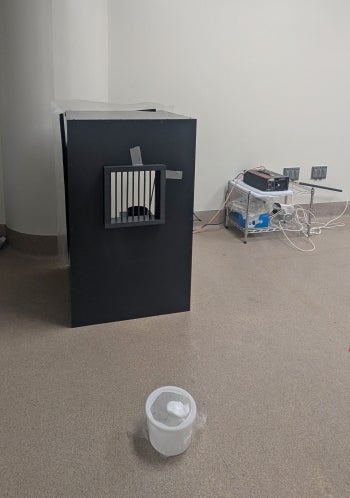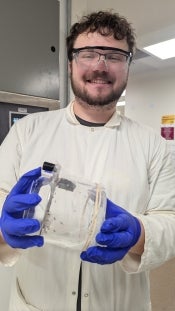New ASU study explores how electric fields could repel mosquitos

ASU master's student Michael Erickson sits at a desk capturing mosquitoes to be used in a flight test. Courtesy photo
Forget insecticides. Next time you’re trying to repel mosquitoes, why not just rig your home with electric fields to zap those pesky buggers away?
That might sound outlandish, but new ASU-led research published in the journal PLOS Neglected Tropical Diseases shows that using electric fields to repel mosquitos could be viable — and worth it.
The study was led by Ndey Bassin Jobe, who graduated with her PhD from Arizona State University last spring.
“I am so excited about the publication of this paper," she said. "It was a major part of my dissertation."
The study details how Bassin Jobe's team created a device rigged with ordinary wires to generate an electric field, which can then be inserted into openings like doors or windows and smaller crevices to repel mosquitoes.
To test whether the device was effective, they set up a mosquito trap with dry ice, which emits carbon dioxide, a compound that mosquitoes are lured to, in their insectary. The team then surrounded the trap with impassible mosquito netting, leaving only the wire-rigged window as a point of entry for the mosquitoes to get to the lure.
Once everything was set up, they released the mosquitoes, let them fly around the room for a day and then counted how many of the insects managed to pass through the electric field. They found that the electric field repelled over half; a promising result for a first trial.
Mosquitos are vectors of life-threatening diseases like malaria, Zika and dengue, which pose a risk to hundreds of millions of people around the world each year. The best way to reduce the spread of those diseases is to control the mosquitoes that transmit them, as there are no drugs or vaccines for many of those diseases.
However, most mosquito-control techniques employ insecticides, which can have consequences to both the environment and human health. Even more worrisome is that mosquitoes eventually become resistant to insecticides, obligating researchers to continually come up with new, more potent insecticides to keep the bugs at bay. Researchers have spent years looking for less destructive and longer-lasting alternatives –– hence, the electric fields.
One of the researchers who has spent years looking into the use of electric fields is Krijn Paaijmans, a man to whom a room full of mosquitoes is not a nightmare but a dream come true.
Paaijmans, who was Bassin Jobe’s doctoral advisor, first started experimenting with electricity to repel mosquitos eight years ago. However, he didn’t have the means to carry out the experiments at a large enough scale to prove the efficacy of the method. Since taking a faculty position at ASU, though, he’s been able to build the insectary where he and his graduate students can safely release mosquitoes in a room to conduct experiments, like the ones that led to the publication of the recent paper.
"What’s very exciting about this paper is that we have been able to pull off these experiments for the first time in our lab here at ASU,” Paaijmans said.
Though Bassin Jobe graduated and has gone on to work at the Centers for Disease Control and Prevention, the work on repelling mosquitoes with electric fields continues. Michael Erickson, a master’s student in Paaijmans’ lab, is building on Bassin Jobe’s work to study not only whether electric fields repel mosquitoes, but how — by looking at the mosquitoes’ flight patterns.
“That should help us figure out what may need improvements to get a higher mosquito repellency level,” Erickson explains.
Bassin Jobe and Paaijmans also share a joint patent on the device they designed for these experiments. They created a prototype using materials they bought at local hardware stores, but later they created more professional prototypes working with ASU’s Machine Shop.
Because of the patent especially, Bassin Jobe says she intends not to leave her mosquito work behind: “I am still very much interested in seeing how this technology unfolds. ... I may not be in the lab, but I’d still like to stay involved and see what (Paaijmans) is working on with the students.”
As for Paaijmans, one of the next steps to seeing if electric fields may be the next big mosquito repellent is taking the device outside the lab.
“We put in some proposals to test our devices outside in Arizona," Paaijmans said, "because there’s various wetlands and riparian areas with lots of mosquitoes. That’s going to be the ultimate test of the efficiency of electric fields in repelling mosquitoes.”
More Science and technology

ASU-led space telescope is ready to fly
The Star Planet Activity Research CubeSat, or SPARCS, a small space telescope that will monitor the flares and sunspot activity of low-mass stars, has now passed its pre-shipment review by NASA.…

ASU at the heart of the state's revitalized microelectronics industry
A stronger local economy, more reliable technology, and a future where our computers and devices do the impossible: that’s the transformation ASU is driving through its microelectronics research…

Breakthrough copper alloy achieves unprecedented high-temperature performance
A team of researchers from Arizona State University, the U.S. Army Research Laboratory, Lehigh University and Louisiana State University has developed a groundbreaking high-temperature copper alloy…




